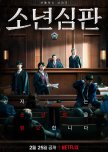A little heavy on the melo, but an original take on juvenile justice
It is a common fault for writers to try too hard. To think that the more emotion they put into the writing, the more the viewer will feel it. Paradoxically, it is the opposite.
The art of moving a viewer is to leave enough space for a reaction to arise within them through their own volition. The more the viewer is told how to think and feel, the less they actually will think and feel. This is not just because we all hate being told what to do, but because it is coming overwhelmingly from the outside, pushing against us and closing down the available space for our own response. We need only enough to peak our empathy, then we will naturally do the rest. And because it is not the emotion of the actor but our own emotional response arising from our own understanding, we will feel it twice as much. Knowing where the trigger point is and just how much is enough for any particular audience,is the thing that separates a brilliant director from an average one.
Here, the director (Hong Jong Chan) did the writer (Kim Min Sook) no favours in overplaying the melodrama. Trauma does not automatically lead to excessive and noisy crying. It can lead to anger, denial, confusion and often numbness and silence. This range of responses can also be utilised by a good director to emphasise the horror of a situation but they were not featured in this drama. By the time we reached episode 9, character after character was either crying or wailing in a string of consecutive scenes that became less and less effective as they rolled by. The result was to distance me rather than draw me in. Which is a pity because this was a powerful drama and had the potential to be more so.
Music also plays an important part in evoking emotion, and here the swelling orchestral music was way too heavy. There was far too much of it, it was far too loud and far too emotive. I found it oppressive.
Having said all that, there was much to appreciate in this production. The characters of the two leads are interesting and well fleshed out. Kim Hye Soo and Kim Mu Yeon gave convincing performances. They represented opposite ends of the spectrum in terms of their attitudes and judgements. It was a wise choice not to have them as adversaries but genuine colleagues who maintained respectful regard for each other. This gave an opportunity for a more rounded viewpoint of the case scenarios, and highlighted the ambivalence that is always present. It meant that the focus remained on the ethics and morals of the action and was not diverted by inter-personal conflict. As a result, there was plenty for the viewer to reflect on.
The treatment of the young people also aimed at more realism than is common in k-dramas, especially in terms of their language, behaviour and attitudes. At times there was confronting material to watch but it was never gratuitous.
This was a deliberately victim-centred presentation and constantly emphasised the impact of anti-social and violent behaviour. As most court and crime dramas are heavily focused on the perpetrators this was a refreshing take on things.
A lot of the dialogue was educational in tone. Some of it out of character for the professional environment it took place in, but not so much that it was irritating. It was forgivable in the circumstances as the juvenile court is rarely depicted and little understood. As a piece of social commentary the show was very successful. As a drama, slightly less so but well worth watching.
What my rating means: 7+ A watchable drama, but nothing exceptional. Good enough to qualify for the race, but finished with the pack. The sort of thing that promises more than it delivers.
The art of moving a viewer is to leave enough space for a reaction to arise within them through their own volition. The more the viewer is told how to think and feel, the less they actually will think and feel. This is not just because we all hate being told what to do, but because it is coming overwhelmingly from the outside, pushing against us and closing down the available space for our own response. We need only enough to peak our empathy, then we will naturally do the rest. And because it is not the emotion of the actor but our own emotional response arising from our own understanding, we will feel it twice as much. Knowing where the trigger point is and just how much is enough for any particular audience,is the thing that separates a brilliant director from an average one.
Here, the director (Hong Jong Chan) did the writer (Kim Min Sook) no favours in overplaying the melodrama. Trauma does not automatically lead to excessive and noisy crying. It can lead to anger, denial, confusion and often numbness and silence. This range of responses can also be utilised by a good director to emphasise the horror of a situation but they were not featured in this drama. By the time we reached episode 9, character after character was either crying or wailing in a string of consecutive scenes that became less and less effective as they rolled by. The result was to distance me rather than draw me in. Which is a pity because this was a powerful drama and had the potential to be more so.
Music also plays an important part in evoking emotion, and here the swelling orchestral music was way too heavy. There was far too much of it, it was far too loud and far too emotive. I found it oppressive.
Having said all that, there was much to appreciate in this production. The characters of the two leads are interesting and well fleshed out. Kim Hye Soo and Kim Mu Yeon gave convincing performances. They represented opposite ends of the spectrum in terms of their attitudes and judgements. It was a wise choice not to have them as adversaries but genuine colleagues who maintained respectful regard for each other. This gave an opportunity for a more rounded viewpoint of the case scenarios, and highlighted the ambivalence that is always present. It meant that the focus remained on the ethics and morals of the action and was not diverted by inter-personal conflict. As a result, there was plenty for the viewer to reflect on.
The treatment of the young people also aimed at more realism than is common in k-dramas, especially in terms of their language, behaviour and attitudes. At times there was confronting material to watch but it was never gratuitous.
This was a deliberately victim-centred presentation and constantly emphasised the impact of anti-social and violent behaviour. As most court and crime dramas are heavily focused on the perpetrators this was a refreshing take on things.
A lot of the dialogue was educational in tone. Some of it out of character for the professional environment it took place in, but not so much that it was irritating. It was forgivable in the circumstances as the juvenile court is rarely depicted and little understood. As a piece of social commentary the show was very successful. As a drama, slightly less so but well worth watching.
What my rating means: 7+ A watchable drama, but nothing exceptional. Good enough to qualify for the race, but finished with the pack. The sort of thing that promises more than it delivers.
Esta resenha foi útil para você?


 3
3 2
2

















